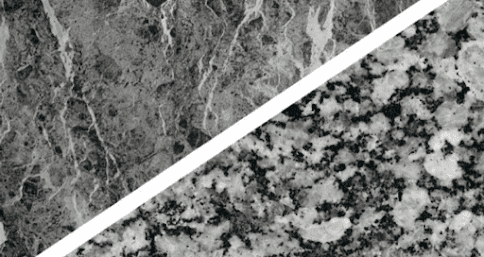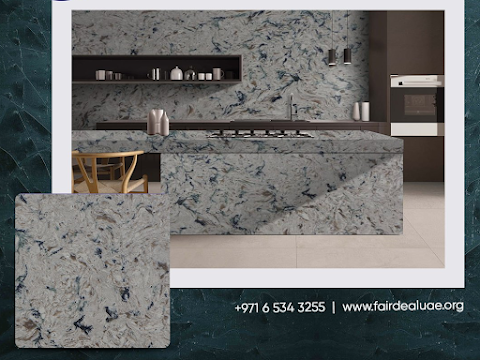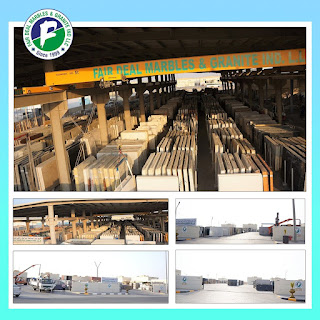Granite vs. Marble for Reception Flooring
Tiled floors are beautiful, and are often the most economical choice when it comes to reception area flooring. But if you want something other than tiled floors, it's worth figuring out what alternatives exist. Flooring is one of the essential parts of designing a reception room. There are numerous types of materials available at Fair Deal natural stone factory in Sharjah, UAE but granite and marble are two options commonly recommended, though they both come with their own set of pros and cons. Let's put aside their popularity and elaborate on the features each stone has.
The Physical Characteristics of
Marble and Granite
Colour
Marble is a metamorphic rock that comes in several different colours, including white, cream, pink, red, green and black. Granite is also available in many different colours, but it’s usually more consistent in colour than marble. This means that if you’re looking to match granite with another material like wood or stone floors, you can easily find a match that will blend well with your reception area flooring options.
Durability
Both marble and granite are very durable, with a hardness of 3-4 and 6-7 on the Mohs scale, respectively. Granite's durability comes from its composition. It is composed of minerals such as quartz, feldspar and mica, which makes it very strong and resistant to scratching, staining, heat and cold. Granite also has quartz veins running through it and these can be felt on touch when the stone is polished or honed. Marble's durability comes from its chemical makeup. Marble is composed of calcite, which is a very strong mineral that forms crystals in three dimensions (in other words: it has a lot of molecules).
Maintenance
Granite and marble stocked by the best granite and marble suppliers in Sharjah are both beautiful, durable and highly-resistant to staining. However, they both require a lot of maintenance.
Marble and granite are made up of minerals that can be polished to a high shine. However, if you don't take proper care of them then they can become dull and scratched.
These stones need to be sealed every three months in order to keep them looking their best. The sealer will protect against stains and help keep the surface from absorbing moisture which can lead to cracks or etching (the appearance of lines on the surface).
If you have scratches in your stone flooring then you may need to have it repaired by someone who knows how to work with granite or marble. This is because these stones are very hard so it takes special equipment and knowledge in order to get them back into shape again after they've been damaged.
It's important that you don't use any harsh chemicals on your granite or marble floors either — this includes bleach.
Porosity
Porosity comes in two types: high and low. High porosity means that a material absorbs water, while low porosity means that it doesn't absorb much water. This can be important because some materials will stain more easily than others, depending on their porosity. And marble and granite are both high-porosity materials.
Granite is much more porous than marble and therefore needs to be sealed with a penetrating sealer. A penetrating sealer will penetrate into the pores of the stone, creating a barrier against stains, watermarks and other damage caused by liquids like coffee. It also helps to improve the shine of the granite or marble. also protects against scratches and dings caused by furniture moving around on top of it.
As a leading supplier of marble and Granites in UAE attests that marble doesn’t require sealing because it’s already sealed at the point of manufacture, it may still need protection, if installed in a high traffic area where liquids are likely to spill on your flooring material. You may want to consider sealing it against staining and scratching from dirt particles that may be picked up off shoes or dropped from hands when walking across your reception area.
The porosity of your reception flooring material is something that should definitely be considered before making a decision about which type of material you choose for your business premises.
Choosing the Best Natural Stone
Flooring
Natural stone flooring has many advantages over carpet and other types of floors. The biggest advantage is durability. Their durability makes them ideal for high-traffic areas such as lobbies, hallways and entrances where they need to withstand heavy foot traffic every day.
Hence marble or granite tiles can withstand heavy foot traffic, making them ideal for reception areas where people walk back and forth all day every day. Natural stone also lasts longer than other types of floors, so you won’t have to replace it as often as you would with other types of floors.
Another advantage is that natural stone can be customised to match any decor style or colour scheme you want for your reception area or lobby space. In addition, it comes in a variety of textures and finishes such as polished, honed, tumbled or rustic that allow you to choose exactly what type of look you want for your building’s entrance way or lobby area.
Is It Easy to Install?
The installation process is much easier with marble than with granite. Granite requires a professional installation, while marble can be installed by anyone with a little bit of carpentry experience.
Marble flooring is also less expensive than granite and can be purchased in tile form. This makes it easy to install yourself if you have the right tools. Granite is more durable than marble, but it does require professional installation.
Bottom Line
We hope
that this has given you a little more insight into granite and marble reception
flooring. It's an important decision in an office or commercial space and it
doesn't happen overnight. Make sure to weigh what's most important to you and
your project, see the benefits and drawbacks of each, and make the call that's
right for you. You may contact renowned UAE marble granite suppliers to get further information that
will guide you in choosing the best natural stone. We'd love to hear from you
about the reception area's natural stone tiles.




Comments
Post a Comment